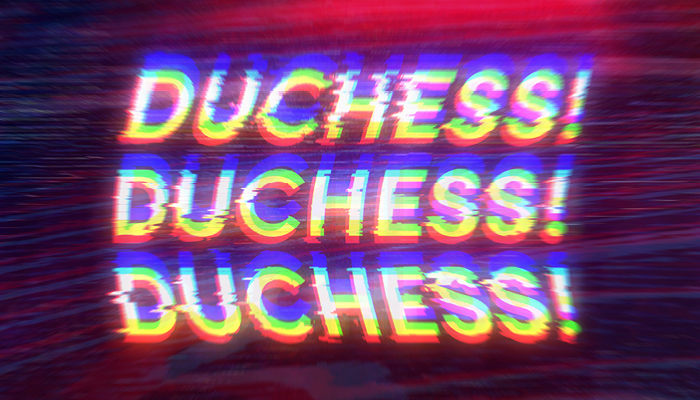
 Not Recommended * Is there institutional or systemic racism in an age-old institution such as the British monarchy? What might be the experiences of the first black member of the British royal family? Is it a foregone conclusion that an African American duchess must be an outcast among the royals because of her background and skin color? These and similar questions could have been examined in the much-anticipated show “Duchess! Duchess! Duchess!” by playwright Vivian J.O. Barnes. The 35-minute video is billed as being “loosely inspired” by Meghan Markle, the mixed race African American Duchess of Sussex, who is currently married to Prince Harry, sixth in the line of succession to the British throne. The production stars Sydney Charles as The Duchess and Celeste M. Cooper as The Soon-To-Be Duchess. In describing her work, Barnes states that the British monarchy is used as a jumping off point to investigate how society’s institutions of power affect black women. I had high expectations for this performance. But the show misses the mark in so many ways. What a disappointment!
Not Recommended * Is there institutional or systemic racism in an age-old institution such as the British monarchy? What might be the experiences of the first black member of the British royal family? Is it a foregone conclusion that an African American duchess must be an outcast among the royals because of her background and skin color? These and similar questions could have been examined in the much-anticipated show “Duchess! Duchess! Duchess!” by playwright Vivian J.O. Barnes. The 35-minute video is billed as being “loosely inspired” by Meghan Markle, the mixed race African American Duchess of Sussex, who is currently married to Prince Harry, sixth in the line of succession to the British throne. The production stars Sydney Charles as The Duchess and Celeste M. Cooper as The Soon-To-Be Duchess. In describing her work, Barnes states that the British monarchy is used as a jumping off point to investigate how society’s institutions of power affect black women. I had high expectations for this performance. But the show misses the mark in so many ways. What a disappointment!
The online video, produced by Steppenwolf Now and available by streaming through the theatre’s website, consists of a two-woman conversation involving what it means to marry into the royal family and become a duchess. According to Barnes, ” The play explores the bigger question of what it means to be a Black woman entering institutions that seem eager to have you but aren’t necessarily built to support you, how you start to adapt in order to survive once you’re inside of them, and the impact of bringing other people like you along.” However, other than the actors being black, there’s nothing uniquely African American about the show. What we do witness, however, is how all women, regardless of race, could easily feel trapped by the pomp and circumstance of royalty and by rigid family traditions that accompany a woman’s place in high society. For example, the video starts out with a lesson in the proper use of titles and how one ought to be addressed, followed by how to sit in a ladylike manner. The Duchess explains how a woman has to grin and bear the restrictions on what she can say or do and how she can behave as well. She has to grudgingly accept that the paparazzi will trail her at every single moment of her life. Of course, as a woman, she would be expected to have babies who will become future royals and possible heirs to the throne.
Let us not forget the comparison with real life. Fresh in my memory is Oprah Winfrey’s sit-down with Meghan Markle and Prince Harry this past Sunday evening on CBS television, which revealed so much about what it means to be a black woman in the British royal family. The juicy takeaway from that interview was that some unnamed family member had “concerns and conversations” about Archie’s potential skin color when Meghan was pregnant; in other words, they wondered how dark their son’s skin will be when he is born. This was not just catty gossip: rather, spoken and unspoken racism, perpetuated by the tabloids, infiltrated into public perceptions of the monarchy and grew into a threat to Meghan, Harry, and Archie’s personal safety. While I have no pretension of thinking that Barnes could or should have predicted any of this, it’s pretty obvious that she should have, at the very least, placed herself in Meghan’s shoes and written about some aspect of the intersection between skin color and the legacy—if not legitimacy—of a thousand-year-old all-white European tradition. Unfortunately, we don’t see an inkling in this performance about how a black woman may have faced racial prejudice, discrimination, or colorism in the role of a duchess or soon-to-be duchess.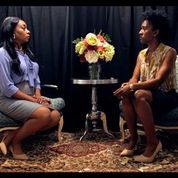
The show is subtitled “A darker version of happened if Meghan Markle had stayed…” This is the only place where Barnes got it right: that is, how being stifled by protocol and being much too tightly constrained in a social role can lead to dark thoughts of suicide and harming oneself. That said, the television news got it right when they captioned the suicide hotline during excerpts of Meghan’s conversation with Oprah. The Steppenwolf should have offered similar advice once the program ended and the credits were rolling. I also wondered if this subtitle was the one and only allusion to skin color—having to do with groundless stereotypes of dark versus light skin among blacks—and if so, I didn’t find it funny.
We see what being silenced by the royal family looks like in “Duchess! Duchess! Duchess!”, and it’s not pretty. Perhaps a few lines from the dialogue can best sum up these emotions: “Fuck tradition!… This is crazy: All these uptight, fucked-up, unseasoned people telling me what to do.” My problem with this rant is not that the Duchess-To-Be is not entitled to her feelings, but it points up yet another problem with the script: that it is completely ahistorical, apolitical, and apocalyptic, if not also apoplectic. For example, the character later adds, “I’m the end of the world. There’s no protocol for the end of the world…. Let’s burn this place to the ground.”
The best part is the camera design, which uses only one camera and skillful editing. First one woman is filmed reciting her lines while the other reads her lines from backstage; then the second woman is filmed facing in the other direction while the first does the same. In just a few places, the two women appear together on stage within the same frame. The clever editing makes it seem as if both are in the same room at the same time, when in fact, they see the other performer via a monitor approximately half the time. In this way, Director Weyni Mengesha, Director of Photography and Editor Lowell Thomas, and Creative Director Joel Moorman paid a nod to social distancing during the pandemic and reduced the costs of production.
Speaking of low-cost design, there was virtually no set and few props, just a black curtain (not hung well), two antique blue chairs, a silver table, an oriental rug, and a vase of cut flowers—when there should have been a much more elaborate set befitting royalty. Lighting was flat throughout. The sound for Charles could have been better. The actress sometimes seemed to mumble at the end of sentences, and there were a few words I could barely catch, even when I replayed that portion of the stream.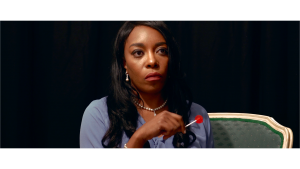
At heart, “Duchess! Duchess! Duchess!” doesn’t know what it wants to be: a real psychological drama, a part ghost/part horror story, a science fiction account about entering another dimension, or something just plain weird and disconnected. Sound design and original music by Pornchanok Kanchanabanca adds to the unreality of the plot with its haunting chords and bizarre sound effects. Was I watching a bad soap opera, or was this the playwright’s shorthand for how people must feel when they are actively leaving their body? Was the horror on stage in the minds of the characters or actually taking place? The show introduces too many negative stereotypes, and I personally have issues with unnecessarily violent and unflattering portrayals of women. I just don’t like seeing people reduced to their baser instincts.
The Steppenwolf Now Virtual Stage is an online series of filmed plays by the Steppenwolf Theatre Company. “Duchess! Duchess! Duchess!” is the fourth of six productions being performed for a virtual audience.
The production will be available for streaming through their website https://www.steppenwolf.org/tickets–events/steppenwolf-now/2020-21/duchess-duchess-duchess/ through August 31, 2021.
Become a virtual member for just $75 and stream content wherever you are, whenever you want.
For more information, please call the box office at 312-335-1650 or email customerservice@steppenwolf.org.
For additional information about this and other shows in the Steppenwolf Now series as well as to learn more about Steppenwolf’s offerings in general, please go to https://www.steppenwolf.org/.
Please consider making a donation today to keep theater alive in Chicago. Visit https://www.steppenwolf.org/support-us/donate/
To see what others are saying, visit www.theatreinchicago.com, go to Review Round-Up and click at “Duchess! Duchess! Duchess!”


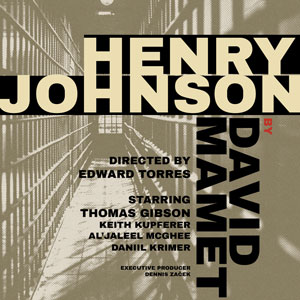
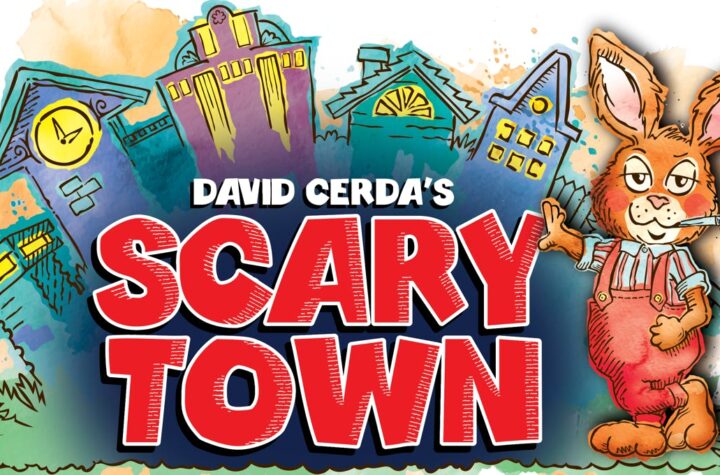
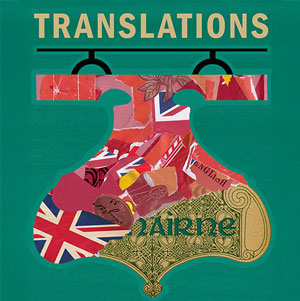
More Stories
“Henry Johnson”
“Scary Town” reviewed by Frank Meccia
“Translations”